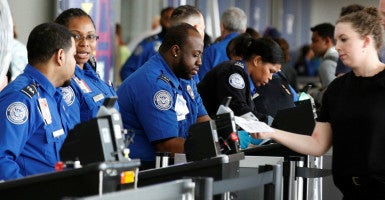Aviation officials described current affairs at the Transportation Security Administration at a House subcommittee hearing in a bleaker light than the organization’s head did the day before.
After the Homeland Security Committee’s interrogation of TSA Administrator Peter Neffenger last Wednesday, top airline officials testified before the Transportation Security Subcommittee the next morning on the skyrocketing wait times at airport security checkpoints.
Here are the biggest takeaways from the hearing.
- TSA airport incompetence hit an all-time high this year.
Although having been an annoyance for years for traveling citizens, the TSA has achieved breathtaking new levels of inconvenience in 2016, with wait times sometimes as high as 120 minutes, executives said.
“We have never seen TSA wait times that affect airlines and passengers throughout the United States like we’ve seen in recent months,” Kerry Philipovitch, senior vice president for American Airlines, said. “Without immediate leadership and innovation, the 231 million Americans that board a plane this summer will be frustrated and angry.”
So far in 2016, more than 70,000 passengers have missed flights and over 40,000 checked bags have been delayed due to TSA bottlenecks on American Airlines alone, Philipovitch said.
Subcommittee Chairman Rep. John Katko, R-N.Y., blasted the TSA for failing to act to fix obvious problems until media scrutiny had reached a fever pitch.
“They did not have a clear picture of the resources they would need to tackle this problem, and clearly were not prepared for it,” he said. “It wasn’t until widespread media reports of passengers on cots and excessive wait times that TSA made the decision to request reallocated assets to help combat the issue.
“[We] are growing increasingly frustrated that TSA needs constant prodding to effect positive changes at the agency.”
- Long lines are not just an inconvenience, but also a potential security threat.
Although executives made clear that they had no interest in compromising security in the interest of processing passengers more quickly, they also argued that inconvenience and lapsed security often go hand in hand.
“In March, suicide bombings at Brussels Airport killed 16 people in the airport check-in areas and 16 others in a city metro station,” Lydia Beairsto, managing deputy commissioner of security for Chicago’s Department of Aviation, said. “Long security lines, large crowds of passengers, and queues are not just an inconvenience. They themselves pose a vulnerability and a security risk.”
- The TSA’s inflexible national policies have compounded the problem.
While executives and representatives largely agreed, as they did last Wednesday, that TSA staffing needs to expand to meet rising air demand, several airline officials also argued that the TSA was failing to properly allocate the resources already at its disposal.
“We have a very dedicated and loyal TSA staff, who are committed to the safety along with the efficient screening of our passengers,” Bonnie Allin, president and CEO of the Tucson Airport Authority, said. “Unfortunately, they lack the planning, coordination and staffing resources needed to be able to efficiently process the passengers at our peak times.”
One key contributor to the problem, Allin said, is that TSA agents are bound by strict protocols that limit their ability to adjust dynamically to changing situations.
“When we were experiencing the extreme lines, the challenge that our local representative with TSA had was the fact that there are specific models, that a certain throughput of passengers per hour have to go through the lane before the second lane can be opened up, and with one standard lane that a second standard lane had to be opened before pre-check,” Allin said.
- Airlines are doing their best to alleviate punishing queue times.
Echoing an open letter the American Airlines’ chief operating officer released last week, Philipovitch said airlines are doing everything they can to divert funds toward assisting the TSA.
“Airlines are pitching in to do our part,” Philipovitch said. “We are committing millions of dollars to fund non-security functions like bin running so TSA can focus solely on screening customers.”
At several points, executives urged the TSA to work more closely with airport authorities to ease wait times.
“TSA needs to do more, and more collaboration is needed to minimize the impact on summer travelers, airports, airline employees, and the overall economy,” Philipovitch said.
- The TSA’s emergency measures have been extremely effective, but long-term solutions are still needed.
Along with Rep. Sheila Jackson-Lee, D-Texas, Beairsto acknowledged that the temporary measures put into place by Neffenger had given some relief to the grueling wait times, which at times this week have been less than 15 minutes. They stressed that such short-term relief was not a substitute for real change, however.
“It’s temporary right now,” Beairsto said. “We need a permanent fix.”




























